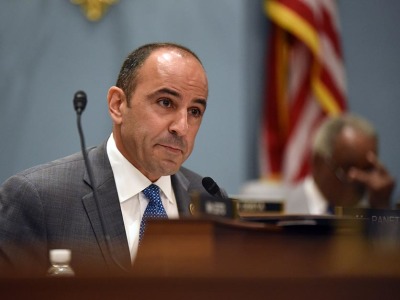Legislative solutions to the most pressing issues facing agriculture are increasingly hard to come by in the currently politically polarized climate, a pair of congressmen told the United Fresh Produce Association Tuesday.
Reps. Rodney Davis, R-Ill., and Jimmy Panetta, D-Calif., were the message bearers as United Fresh members at the group's annual Washington conference prepared to embark on a series of meetings on Capitol Hill, where they will press lawmakers on hot-button issues like labor, trade and the farm bill.
Despite their differing party affiliations, Davis and Panetta are friends who have visited each other’s districts. They also both serve on the House Agriculture Committee and are self-identified optimists. Davis is also on the farm bill conference committee.
Neither, however, could offer assurances that the farm labor crisis will be fixed, trade disputes resolved, or the farm bill passed by a date certain. But they’re hopeful.
On the farm bill, Davis said Congress’ penchant for operating best on deadline “makes me optimistic that we might be able to put a good bill together.” He said, however, that he was frustrated by the increased level of partisanship over the farm bill, compared to the 2014 version.

Rep. Rodney Davis, R-Ill.
Panetta, who represents the produce-rich Salinas Valley, said his optimism on farm bill prospects stems from his understanding of the close relationship between Senate Ag Committee Chairman Pat Roberts, R-Kan., and Ranking Member Debbie Stabenow, D-Mich.
Acknowledging Congress is probably going to have to extend the provisions of the last farm bill to be effective beyond Sept. 30, Panetta said, “Hopefully, after the election we’ll be able to come back and get it done," referring to the mid-term balloting in November.
After appearing with Davis, Panetta told Agri-Pulse that if Democrats take back the majority in the House, “then I think there’s going to be less reason for the Republican leadership ... to continue to try to push through the significant changes on SNAP,” the Supplemental Nutrition Assistance Program. The House farm bill would tighten work rules for the program.
Interested in more news about the farm bill, trade issues, pesticide regulations and more hot topics?
Sign up here for a four-week Agri-Pulse free trial. No risk and no obligation to pay.
The influence of taking back the majority in the House on top of the leadership of Roberts and Stabenow, that gives me hope,” he said.
Davis said after the session that the SNAP reforms in the House bill would help people find jobs.
“What’s not getting enough press is our historic investment in education, training and skills,” he said. “We’re going to invest a billion dollars a year in education, training and skills, to get people who are stuck in poverty … the education and training they need to go get jobs that are available.”

Rep. Jimmy Panetta, D-Calif.
“We’re not going to send them to get four-year degrees,” he said, but with the proper training, ”You can go from wondering what you can and cannot buy with your SNAP benefits to buying whatever you want. That’s life-changing.”
Robert Guenther, United Fresh’s chief lobbyist, said his group is concerned that if the 2014 farm bill is simply extended, “We don’t get to see some of the potential benefits we have seen in both (bills) to move forward on our research priorities,” such as mechanization and a solution to citrus greening, which has decimated citrus groves in Florida.
On the labor issue, Panetta said, “Immigration is the most politically sensitive and complex policy issue I’ve dealt with in my 20 months in Congress.” But despite the need to find a solution for agriculture, which is suffering from a labor shortage, "I do not see anything happening (in Congress) at this point … but I will continue to lead the charge to have some kind of immigration reform.”
Davis said the immigration issue had been “hijacked by the far right and the far left,” but that the November elections could create a favorable atmosphere for compromise. “With a smaller majority on either side, it actually gives people like Jimmy and me a better chance to work something out.”
On trade, Davis said he’s very concerned about a continuing trade war with China, which has been a major buyer of U.S. soybeans. The farmers in his district in north-central Illinois “are really invested in supporting this administration,” mentioning a meeting he held with producers who are confident President Trump will get them “a better deal.”
For more news, go to www.Agri-Pulse.com


![Steve headshot 250x200[1]](http://www.agri-pulse.com/ext/resources/Headshots/Staff-Photos/thumb/Steve_Headshot_250x200[1].JPG?1738947158)